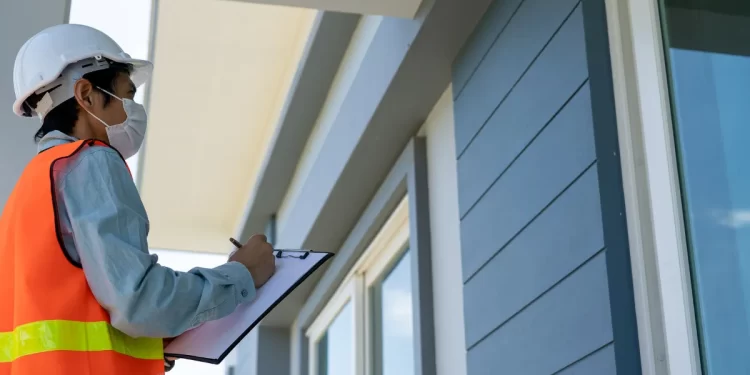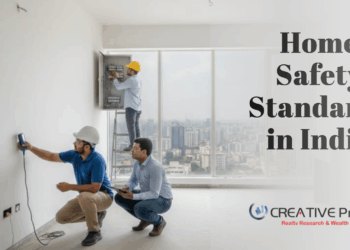Home Inspection safeguards your real estate investment. The Home inspection gives you complete idea of property condition before making the purchase decision.
And Buying without Home Inspection can lead to huge losses and unavoidable costs in the future.
In this article, you will understand what is home inspection? and get answers to the questions like when you should home inspection, what is includes in home inspection and home inspection costs etc.
What is a Home Inspection?

A home inspection is a thorough examination of the condition of a residential property.
The inspection focuses on evaluating the physical structure and systems of the house, identifying any potential issues or necessary repairs.
The Home inspection is done by qualified civil engineers or the licensed professionals.
The objective of home inspection is to provide the buyer with a detailed report outlining any existing or potential problems.
This report allows home buyers to make an informed decision about the purchase of the property.
Here are the components checked during home inspection.
Structural Components: Walls, ceilings, floors, doors, windows, stair steps, and stair railings.
Roofing: Condition of the roof and balconies
Plumbing: Water supply, drainage systems, and water heaters.
Electrical Systems: Wiring, outlets, and electrical panels.
Interior Features: Cabinets, countertops, and applicable installed appliances.
Exterior Features: Foundation, grading, and drainage.
Insulation and Ventilation: Adequacy of insulation and proper ventilation in spaces
When You Should Do a Home Inspection?

As a thumb rule, you should do home inspection should be done before buying a house or property.
This will allow you to understand whether ths property is worth investing or not.
If there are too much issue with the property you can avoid the investment directly.
On the other hand if the issue are minor, you can negotiate the price.
So, before buying a property you should make home inspection from experts.
Here are scenarios when you should do a home inspection-
When Buying a New Property:
Before finalizing a new property purchase, it’s essential to understand its condition. An inspection can uncover hidden problems, helping you make an informed decision.
When Buying a Resale Property:
Older homes can have hidden issues from structural problems due to age or any other interior issues.
An inspection helps identify these concerns, protecting your investment.
When Renovating a Property:
Before starting renovations, an inspection can highlight areas that need attention. This will also help you to prepare your budget for the renovations.
When Renting a Property:
If you renting an expensive apartment it is advised to do a home inspection to check its safety.
Ensure your new rental meets safety and living standards
Make further process only after you are satisfied by the Home Inspection Report.
When Constructing a Property:
During construction, inspections at critical stages ensure the work meets building codes and your expectations.
Regular inspections can catch issues early, preventing costly corrections later.
Developers generally construct properties with the help of third party construction companies.
Home inspection can allow developers to ensure that the third party companies are delivering the quality.
What is Checked during a Home Inspection?

Home inspection involves all the things that are important to safeguard you and your investment.
Here are list of things that are checked during the home inspection-
Flooring & Kitchen Platform:
- Visual inspection of tile aesthetics
- Tiles finishing
- Color variation
- Alignment
- Puddle formation
- Tap test to check hollowness
- Leepage identification
- Slope inspection with inclinometer for smooth water flow
Walls & Ceilings:
- Visual inspection of walls and ceiling aesthetics
- Paint finishing for identification of cracks and molds
- Color variation
- Tap test to check hollowness
- Slope of walls checked by inclinometer
Plumbing:
- Inspection of fixtures and fittings for their joints
- Quality of fixtures and fittings
- Working operations of plumbing fixtures
- Inspection by borehole camera for nahni traps
- Water pressure test by pressure gauge
Doors, Windows, & Grills:
- Visual inspection of doors, windows, and grills for aesthetics
- Size and form
- Finishing
- Working operations for smooth usage
Electrical:
- Visual inspection of electrical panels and fittings
- Fittings operations
- Voltage testing of sockets
- Identification of neutral and earthing connections.
What is Included in a Home Inspection?

A home inspection includes a thorough quality check of property.
In Home Inspection, the certified experts use high-tech tools to detect the possible flaws in the property.
The home inspection process starts with the comprehensive recee of the property. This is followed by the preparation of the list of elements to be checked.
These elements can vary from one property to the other. But the core elements such as structural checks, plumbing and flooring etc is applicable for all the home inspections.
After thism home inspection experts do the visual analysis of the property and note down the observations.
Then the high-tech invesption tools are used for each of the elements listed in the previous stage.
One-by-one each element is checked and the observations are noted down.
Then the experts prepare detailed report along with the necessary advice on the property purchase decision.
What is the Cost of a Home Inspection?
The cost of home inspection depend on the size of the property and the number of elements you are checking.
Some home inspection providers give basic, advance and premium packages which contains various levels of home inspections.
The cost of home inspection in India starts from Rs 85000. The final home inspection cost can be determined by the home inspection experts before doing the home inspection.
What is Thermal Imaging in Home Inspection?
Thermal imaging in home inspections is conducted using an infrared camera. Inspectors use this infrared scanning technique to provide information on issues that are not directly visible to the naked eye. The issues identified by thermal imaging are:
- Heat gain or loss through the exterior walls and roof
- Moisture leaks
- Improper electrical system conditions
- Insulation deficiencies
- Electrical overheating
- Inefficient heating or cooling due to leaks or blockages
- Potential fire hazards due to overloaded circuits or faulty wiring
Benefits of a Home Inspection

Now we have understood what is home inspection and what it involves. Now, let’s dive into what are the benefits of Home Inspection.
The biggest benefit of doing home inspection is that it gives investment safety.
It is always better to do home inspection that costs you few thousands to safeguard your investment of property worth lac of rupee.
Here are most important benefits of Home Inspection
Provides an in-depth overview of the property’s condition.
Assesses the quality of construction and finishes.
Validates the value of the home and investment.
Offers a comprehensive report for future reference.
Helps in negotiating a better deal based on inspection findings.
Estimates the future costs of replacements and repairs.
Highlights necessary repairs and maintenance needs.
Gives peace of mind about the investment.
Frequently Asked Questions
Q1. Is a home inspection mandatory in India?
No, home inspections are not mandatory in India, but they are highly recommended to identify potential issues and ensure the property is in good condition.
Q2. How long does a home inspection take?
A typical home inspection takes 2 to 4 hours, depending on the size and complexity of the property.
Q3. Can a homebuyer attend the home inspection?
Yes, homebuyers are encouraged to attend the inspection to see any issues firsthand and ask questions.
Q4. How often should I get a home inspection?
It’s recommended to have a home inspection every few years to maintain the property and address emerging issues.
Q5. What is not included in the home inspection service?
Home inspection services do not include low-wattage electrical features, radon inspection, inaccessible areas, pest control, or landscaping.
Q6. Are new homes exempt from inspections?
No, new homes should also be inspected to identify any construction flaws or mistakes.






